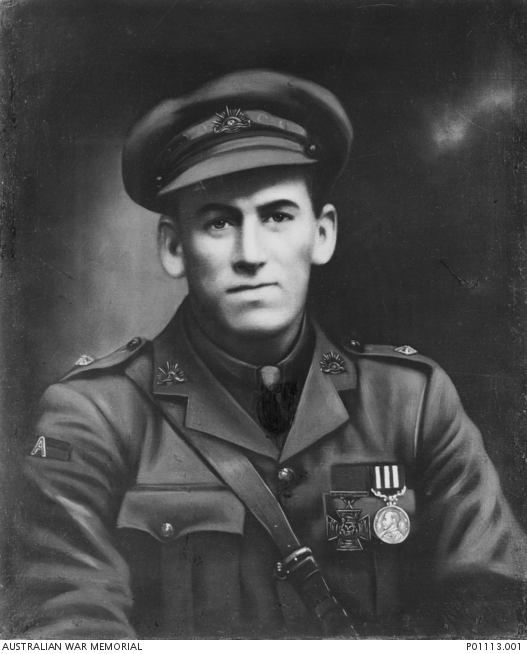2nd Lt
Frederick Birks
Information about birth
|
Date of birth: 31/08/1894 |
|
Place of birth: Buckley, Flintshire, Wales, United Kingdom |
General information
|
Profession: Labourer |
Army information
|
Country: Australia |
|
Force: Australian Imperial Force |
|
Rank: Second Lieutenant |
|
Enlistment place: Melbourne, Victoria, Australia |
|
Units: — Australian Infantry, 6th Bn. (Last known unit) |
Information about death
|
Date of death: 21/09/1917 |
|
Place of death: Glencorse Wood, Zonnebeke, Belgium |
|
Cause of death: Killed in action (K.I.A.) |
|
Age: 23 |
Cemetery
|
Perth Cemetery (China Wall) Plot: I Row: G Grave: 45 |
Distinctions and medals 4
|
British War Medal Medal |
|
Military Medal Medal |
|
Victoria Cross Medal |
|
Victory Medal Medal |
Points of interest 3
| #1 | Place of birth | ||
| #2 | Enlistment place | ||
| #3 | Place of death (approximate) |
My story
Born in Wales in 1894, Frederick Birks had served in the Royal Artillery before arriving in Australia. Here, he worked as a waiter and a labourer before enlisting at the outbreak of World War I in the 2nd Field Ambulance. Birks was awarded the Military Medal after Pozieres. Originally enlisted as a Private, Birks was promoted several times before his final promotion to 2nd Lieutenant in the 6th Battalion on 26 April, 1917.
On 20 September, during the advance through Glencorse Wood, 2nd Lieutenant Frederick Birks, accompanied by Corporal W. Johnston, charged at a pill box, which was slowing the Battalion’s advance. It was these actions that led to his nomination for and ultimate awarding of the Victoria Cross the highest award for bravery. The Unit’s official War Diary reads:
“The series of dugouts along edge of Glencorse Wood, J.14.b.5.6 were attacked mainly under the direction of Lt Birks who quickly overcame a temporary resistance of MGs & bombs.”
Ron Austin, author of the Unit’s history, writes
“Birks, accompanied by Corporal W. Johnston, immediately charged at the pill box. The Germans on seeing the two men approaching, threw several bombs. Johnston deliberately placed himself in front of Birks and took the full force of the explosion. The badly wounded Johnson was recommended for a Victoria Cross, but was only awarded a Military Medal for his courage. The undaunted Birks safely reached the pill box, whereupon the occupants immediately surrendered. Following that incident, Birks led a small party of men in an attack upon a strong point occupied by 25 Germans. In the ensuing struggle, nine Germans were killed and an officer and 15 men captured.”
The next day, 21 September, 1917 the Germans shelled the Australian positions, and some men were buried in rubble when the “D” Company post in Glencorse Wood was hit. Lieutenant Birks, despite being himself under fire, started to dig out the men but in doing so was killed by a shell. Lieutenant Birks was Killed in Action on 21 September 1917 having already received the Military Medal and would then be posthumously awarded the Victoria Cross. The 23-year-old was buried at the Perth (China Wall) Military Cemetery:Plot I, Row G, Grave 45. “Greater Love Has No Man Than This That He Lay Down His Life For His Friends” is the inscription on his gravestone.
On 20 September, during the advance through Glencorse Wood, 2nd Lieutenant Frederick Birks, accompanied by Corporal W. Johnston, charged at a pill box, which was slowing the Battalion’s advance. It was these actions that led to his nomination for and ultimate awarding of the Victoria Cross the highest award for bravery. The Unit’s official War Diary reads:
“The series of dugouts along edge of Glencorse Wood, J.14.b.5.6 were attacked mainly under the direction of Lt Birks who quickly overcame a temporary resistance of MGs & bombs.”
Ron Austin, author of the Unit’s history, writes
“Birks, accompanied by Corporal W. Johnston, immediately charged at the pill box. The Germans on seeing the two men approaching, threw several bombs. Johnston deliberately placed himself in front of Birks and took the full force of the explosion. The badly wounded Johnson was recommended for a Victoria Cross, but was only awarded a Military Medal for his courage. The undaunted Birks safely reached the pill box, whereupon the occupants immediately surrendered. Following that incident, Birks led a small party of men in an attack upon a strong point occupied by 25 Germans. In the ensuing struggle, nine Germans were killed and an officer and 15 men captured.”
The next day, 21 September, 1917 the Germans shelled the Australian positions, and some men were buried in rubble when the “D” Company post in Glencorse Wood was hit. Lieutenant Birks, despite being himself under fire, started to dig out the men but in doing so was killed by a shell. Lieutenant Birks was Killed in Action on 21 September 1917 having already received the Military Medal and would then be posthumously awarded the Victoria Cross. The 23-year-old was buried at the Perth (China Wall) Military Cemetery:Plot I, Row G, Grave 45. “Greater Love Has No Man Than This That He Lay Down His Life For His Friends” is the inscription on his gravestone.
Sources 5
|
6th Australian Infantry Battalion, (Australian War Memorial, Campbell (AWM), AWM4 23/23/22). https://www.awm.gov.au/collection/C1338583 Sources used |
|
Austin R., As Rough as Bags: The History of the 6th Battalion, 1st AIF, 1914-1919, (McCrae, Slouch Hat Publication, 2005), pg. 208-213. Sources used |
|
Australian War Memorial https://www.awm.gov.au/collection/P11012602 Sources used |
|
First Australian Imperial Force Personnel Dossiers, 1914-1920, (National Archives of Australia, Canberra (NAA), B2455, BIRKS F). https://recordsearch.naa.gov.au/SearchNRetrieve/Interface/SearchScreens/NameSearch.aspx Sources used |
|
McCarthy C., Passchendaele. The Day-by-Day Account, (London, Uniform, 2018), pg. 80-81. Sources used |
More information 4
|
Lives of the First World War (Imperial War Museum) https://livesofthefirstworldwar.iwm.org.uk/lifestory/7303136 |
|
Namenlijst (In Flanders Fields Museum) https://namenlijst.org/publicsearch/#/person/_id=c90ddb67-e3b7-4566-8843-670dd1444403 |
|
Commonwealth War Graves Commission Database https://www.cwgc.org/find-records/find-war-dead/casualty-details/103010 |
|
The AIF Project (UNSW Canberra) https://aif.adfa.edu.au/showPerson?pid=23232 |
